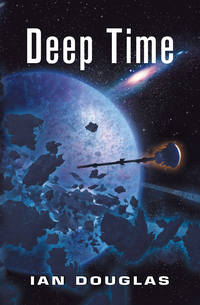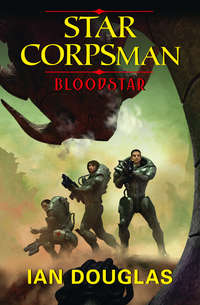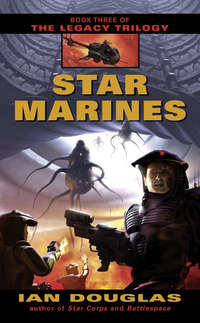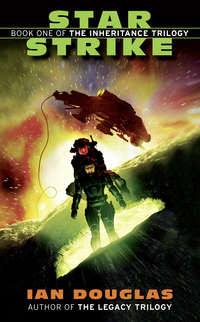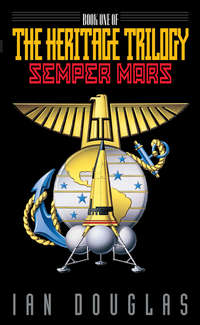
Полная версия
Star Corps
A preliminary publication on the find in an archeological journal had triggered excitement worldwide, as well as a sharp rejection by the Islamic Kingdom of Allah. The local government authorities had ordered the Giza excavations closed down and all foreign archeologists to leave the country. From then on, all excavations in Egypt and other Kingdom of Allah states would be carried out by approved Islamic archeologists, under the direct supervision of the Islamic Directorate of History in Baghdad.
To Warhurst, it sounded like a hell of a stupid way to do science.
“We will not let the foreign satans take truth and twist it into blasphemy!” ibn-Khadir was shouting to the crowd. “The time has come to throw the foreigners out, to reclaim our history for ourselves, in the blessed name of Allah!”
The cheer that went up from the mob was audible across two kilometers of open ground. Warhurst felt an uneasy chill, despite the heat of the afternoon. Ibn-Khadir was bringing their fervor to a boil, and it wasn’t hard to guess what would happen next.
“They’re going to try a goddamned puppy rush,” Karelin said, echoing Warhurst’s own thoughts.
A puppy rush. Shit. Most of the people in that crowd were unarmed, as far as Warhurst could tell from the MD-30’s magnified sniperscope image, though a few Chinese and Iranian assault rifles were in evidence. Many were women, many more teenagers and younger. The KOA militia leaders might well have decided to rush the Marine perimeter with civilians, hoping that the Americans wouldn’t “kick the puppies,” that they would at least hesitate and not open fire until armed militiamen could get close enough to begin killing Marines.
The hell of it was that a civilian charge, or an assault shielded by unarmed civilians, was a lose-lose proposition for the Marine defenders. If they held their fire, the enemy would break through the perimeter and be among them; no matter how good the Americans’ mil-tech, they would be too badly outnumbered to survive a close-quarters battle.
But if the Marines opened fire, the up-close-and-personal images of unarmed Islamic civilians being slaughtered at long range would be uploaded to every e-news server on the Net, to be replayed time after time in gory and colorful detail on the viewalls and HVs of half the people on the planet. It would be a moral nightmare from which the UFR might never recover.
But maybe there was a different way.
“Downsize a click,” he told Karelin. “And fire up your see-through.”
“Aye aye, sir.”
The generator in her rifle began spooling up to speed. The view of ibn-Khadir seemed to pull back twenty meters, revealing all of the truck he was standing on and more of the surrounding crowd. “Smile for the camera,” Karelin said, and she fired the X-ray scatter pulse.
The image in Warhurst’s display blanked out, showing nothing but green light. In a few seconds, however, the gun’s computer built up a composite image from the backscattered X rays, an image that turned sheet metal, plastic, cloth, and flesh into faint translucence, revealing denser structures like bone and the solid titanium steel of the hovertruck’s engine block in light green, yellow, and pale green-white.
To avoid burning people in the target area, the pulse lasted for only a handful of nanoseconds, so the initial image was frozen in time. The computer superimposed that image on the real-time view, however, animating it to match the moving reality.
“There,” Warhurst said. “See the flywheel on the drive train?”
“Roger that,” Karelin said. The targeting reticle shifted again, coming to rest over the circular mass of the hovertruck’s flywheel. Dopplered readings on the back-scatter radiation showed that it was in motion.
The Egyptian hovertruck was powered by pretty old tech, a hydrogen-burning power cell array that in turn powered the turbine compressors of two large lift fans in the vehicle’s chassis. The fans were off, the vehicle grounded on its plenum chamber skirts, but the power assembly was still running, storing energy in the massive, fast-spinning flywheel that provided both extra power on demand and gyroscopic balance.
“See if you can nick that wheel,” Warhurst said.
“Ay-firmative, Skipper!” Karelin leaned into the stock of her weapon again. There was a faint whine as its magfield generators came up to full power, and then a piercing crack as she squeezed the trigger.
Gauss rifles, rail guns, mass drivers—all terms for the same simple concept. The MD-30—MD for “mass driver”—was a sniper’s rifle, using an electromagnetic pulse to launch a 250-gram sliver of steel-jacketed depleted uranium with a muzzle velocity of approximately Mach 25.
The truck beneath ibn-Khadir’s feet jerked sharply with the impact, the engine access panels snapping open, the plastic windshield shattering. The impact smashed the engine block wide open, smashed the durasteel-armored flywheel housing, and cracked the flywheel itself. In an instant the truck’s body was flipped into the air, sending the Mullah ibn-Khadir flying in a thrashing tangle of robes and limbs. The vehicle’s steel and plastic shell absorbed most of the high-speed shrapnel from the flywheel, but torque ripped the vehicle open and bounced it onto its roof.
The crowd, cheers turned to shrieks of terror, broke and scattered in all directions. The hovertruck’s hydrogen cells, ripped open by the impact, ignited, sending a ball of orange hydrogen flame blossoming into the sky. In an instant the more or less orderly gathering was reduced to chaotic pandemonium, as civilians and militia troops fled the burning wreckage. Several dozen bodies lay around the truck, hit by shrapnel or stunned by the sonic crack of the hyperprojectile—it was impossible to tell which. Ibn-Khadir was sprawled ten meters from the wreck, weakly moving as two of his braver supporters tried to help him to his feet.
“Taking kind of a chance, aren’t you, Skipper?” Lambeski asked with a matter-of-fact expression. “Burning civilians like that …”
“Burning hydrogen rises,” Warhurst replied. “That’s why only thirty-some people died on the Hindenburg.”
“The what?”
“Never mind. We might have hit a few civilians with flying chunks of truck, but it happened so quickly, I doubt the newsie remotes saw what happened or could reconstruct it. And I don’t think they’ll be eager to try another mob rush, do you?”
“You got that right, sir,” Karelin said. “Look at ’em run!”
She’d stepped the magnification on her scope down to take in the entire sweep of the west bank of the Nile, from El Giza north to the University of Cairo and beyond to the district of El Duqqi. The panicked mob was dispersing back across the Gama and Giza bridges.
The mullahs might be able to assemble the mob again, but it would take time.
And maybe help would arrive by then.
Maybe.
4
5 JUNE 2138
Giza Complex
Kingdom of Allah, Earth
1838 hours Zulu
Like a large and exceptionally ugly beetle, all angles and planes and outstretched landing jacks, the first dropship drifted down out of the evening sky on shrieking plasma thrusters, moving toward the bare patch of desert south of the Sphinx marked by the brilliantly pulsing green landing beacon.
Unlike the suborbital TAVs that had brought in the Marines, these were true spacecraft, big UD-4 Navajo cargo landers generating a million pounds of thrust through their six Martin-Electric plasmadyne jets. Air scoops gaped now, fans howling, gulping down air as reaction mass, saving precious water for higher altitudes, where the air ran thin or trailed away into vacuum.
Sand exploded in swirling clouds from beneath the lander as it touched down, sagging slightly as its hydraulics took up the shock of landing. Belly doors gaped open, interlocking square teeth sliding apart to disgorge eight light Rattlesnake robot tanks, four Cobra medium MBTs, a pair of massive Gyrfalcon mobile artillery crawlers, two twenty-ton cargo floaters, and four armored personnel carriers. The dropship lifted again in a sandblasting whirlwind as soon as its cargo was clear. Other dropships were touching down at marked LZs elsewhere across the Giza Plateau.
Warhurst trotted up to the lead APC, which was just beginning to unbutton. The markings indicated American rapid-deployment infantry. He was surprised, having expected a joint Confederation unit coming in by TAV from the UK, not American troops. And the UD-4s meant they’d deployed from orbit, probably from the Army’s Rapid Deployment Force Orbital Station in low orbit.
A man in an Army active-camo armor cuirass and brown fatigues, with a major’s oak leaf insignia painted on his shoulder pieces and the RDF’s lightning bolt insignia on his breast, clambered down the aft ramp as a line of fully armored troops piled out of the APC and jogged out onto the sand.
“Who’s in charge here?” the major demanded.
“Captain Warhurst, 2nd Regiment, U.S. Marines.” He didn’t salute. Standing orders required a suspension of any military protocol that might allow the enemy to target officers.
“Major Rostenkowski, 5th Light Infantry.”
“Welcome to Egypt, Major.”
“Good to be here. You are relieved, Captain,” the major said. “The Army has the situation in hand.”
“About damned time, Major,” Warhurst said. He turned his head to watch the soldiers falling into line as a sergeant bawled orders at them. “What happened to the Confed relief?” The last he’d heard, his relief was supposed to be a couple of Russian platoons, some light German armor, and a detachment of Brits.
Rostenkowski grinned. “Bogged down in politics, as per SOP. Washington is getting it from all sides these days, and the Confederation isn’t sure they want to play along. The Joint Chiefs elected to send us instead. You and your boys and girls are to hustle ass back to Quantico for debrief. What’s your tacsit?”
“Give me your feed channel, sir.”
They matched ’ware frequencies, and Warhurst thought a packet of detailed tactical data to Rostenkowski’s biocybe system, providing him with detailed information on the initial assault, the counterattack, and the overall situation since.
“Nice twist, using a sniper to discourage that attack,” the major said. “Any civilian casualties?”
“We’re not sure. Our spotters saw ambulance crews picking up four people, but we don’t know if they were dead or just badly hurt when the truck exploded.”
“Well, the important thing was to keep that sort of thing out of the newsies’ eyes. Good work, Captain.”
“Thank you, sir.” He was somewhat irritated by Rostenkowski’s brusque manner. His Marines had done a hell of a job these past four days, and he was being congratulated for his public relations skills in keeping the collateral damage he’d inflicted out of the netnews downloads.
“This is an Army deployment area now, Captain. Tell your people to stand down unit by unit as we relieve them.”
“Aye aye, sir.”
“Oh, and you’d better get yourself presentable.”
“Sir?”
“A special TAV is being vectored in to pick you up. Should be grounded within fifteen mikes.”
Warhurst looked down at himself. He was wearing his armor, sans helmet and gauntlets, and the active camo surface was sand-pitted, gritty, and streaked with grime. His one-piece underneath was sweat-soaked and rank; he’d not had a bath in four days, and he knew his depilatory had worn off a couple of days back, leaving him with a distinctly unregulation shadow on his face.
He’d not brought much in the way of toiletries or spare uniforms … not for a deployment that was supposed to last for a day, two at the most.
“A TAV? Taking me where?”
Rostenkowski shrugged. “Back to Quantico. Don’t know why. All I know is to tell you to be ready to go … and to leave your people in charge of your number two.” Rostenkowski turned then and began shouting orders at the soldiers unloading supply crates from one of the transport floaters.
Warhurst used his internal mapping biocybes to locate his XO. He would have to let her know what was going down.
And where the hell was he going to find a clean uniform?
Esteban Residence
Guaymas, Sonora Territory
United Federal Republic, Earth
0902 hours PT
“I’m leaving, Mom. I have to.”
They strolled along the stone-strewn beach, the oily gray surf of the Sea of California lapping at their feet, the muddy breakers just ankle high. The sun blazed low above the mountains in the east, promising another sweltering day. Both John and his mother wore lightweight bodysuits against the UV and the heat, and their faces glistened with blocking oils generated by antisun nanotreatments.
“I know, Johnny. I just wish you weren’t joining the Marines, is all.”
“Why?” He tried a grin. “It’s not like we don’t have it in our blood. Garroway’s March?”
“Oh, it’s in your blood, all right. Damn it.”
“The thing is, I don’t want to leave you. Dad can be … tough to live with.”
She sighed. “Don’t I know it? But … he means well. He’s just … under a lot of stress lately, is all. …”
“Damn it, Mom, I wish you’d quit making excuses for him. He drinks too much, and when he’s drunk, he loses his temper. The cybercontrols don’t seem to be helping him much.”
“He disabled them.”
“What?”
She nodded. “About six months ago. He admitted it to me, during a fight. He said the control implant made him feel like he wasn’t himself.”
“Does his doctor AI know?”
“I don’t know. It’s his business, not mine.”
“It’s your business if he hits you! If he makes your life miserable!”
“He’s only … gotten physical a couple of times. …”
“That’s a couple of times too damned many!” He shook his head. “Maybe I shouldn’t leave after all. …”
“No, Johnny. No, you were right the first time. You’ve got to go. Maybe if you do, there won’t be as much holding me here.”
“I worry about you, Mom.”
“Don’t. I can look out for myself.”
“Mom, I’ve been researching this, downloading stuff from the psych library in Hermosillo. Dad is an abuser. A clinically abusive personality. If we stay here—if you stay here—he’ll hurt you. Maybe worse. You’ve got to get out.”
“It’s not that bad, Johnny. Really. It’s just sometimes he can’t control himself.”
“Bullshit.”
“What?”
“I said, bullshit. Look … the last time he hit you … if there’d been a cop in the living room that time, or even a security robot, recording what happened, do you think he would have touched you?”
“That’s not—”
“Would he have hit you if anyone was there?”
She struggled with the thought for a moment. “Well … no.”
“Then he can control himself. Don’t you see? He hits you because he can, because he knows he can get away with it, and it’s a way of exercising power. And it’s not just the hitting. Words can hurt as much as fists sometimes, you know? What the downloads I’ve been looking at call emotional abuse. And the way he spies on us, tries to go through our private cyberfiles …” John shook his head, feeling desperate. “That’s why I’ve got to leave, now. I just can’t take it any longer. If I don’t leave now—”
“I know, son. I want you to go.”
“But I don’t want to abandon you.”
“You’re not. I told you to go, didn’t I?” She managed a smile. “Don’t worry about me. I’ve been thinking … I’ve been thinking about my sister in San Diego, maybe going up and seeing her.”
“If you do, Mom, don’t come back. Please?”
“We’ll see. As for you … you’ll be careful?”
“As careful as they’ll let me be.”
“It’s just that … Wouldn’t the Navy be … well … cleaner?”
He laughed. “No muddy foxholes on a high guard cruiser, that’s for sure. But, no. I’ve wanted to go with the Corps ever since I read Ocher Sands.” He’d liked the downloaded drama so much that he’d bought the hardcopy book as well. He’d been enticed by the fact that it was about his great-grandfather, “Sands of Mars Garroway,” and his grandmother, Caitlin. But he’d been permanently hooked by the tales of Marine men and women serving off-world, on the moon, Mars, and the Jovian satellites.
“I hear it’s awfully hard. The training, I mean.”
He reached down, picked up a flat stone the size of the palm of his hand, and sent it skipping out across the waves three … four … a fifth skip before it sank. “Yeah. And I’ll tell you the truth, Mom. I don’t know if I can cut it. But I know I have to try.”
“I imagine with that kind of attitude, you’ll make it. I’m proud of you, Johnny.”
“Thanks, Mom. Are you … you’re sure you’ll be all right?”
“I’ll be fine. Will you be okay?”
“Sure! Plenty of fresh air and exercise? Plenty to eat? And plenty of friendly, helpful drill instructors to remind me of Dad in his more emotional moments, just so I don’t get homesick.” He didn’t add that Lynnley would be there too. His mom knew he and Lynnley had been seeing each other, but he didn’t think she would understand their pact. She might think he was joining the Marines just because Lynn was joining, and that wasn’t the way things were at all.
“One question, son.”
“Shoot.”
“Do you still want to be assigned to space duty?”
“Well … sure. I’ll take SMF if it’s offered. That’s where the real excitement’s at, you know.”
She made a face. “Yes. I know. But you might be gone … a long time.”
“Probably. A couple of years, maybe, for a hitch on Mars. That’s not so bad.” He hadn’t told her that he’d already dreamsheeted for Space Marine Force duty with the recruiter. Not that he was all that likely to land a space billet, but he wanted the chance, and bringing that bit of news into the conversation would … complicate things.
“Let’s just wait and see what happens, okay?” he told her.
She smiled. “Okay.”
They turned around and began strolling back up the beach toward the steps leading up the cliffs to the house.
IP Packet Osiris
En route, Mars to Earth
1847 hours Zulu
Dr. Traci Hanson was still furious, two days after she’d left Mars. How dare they interrupt her work at Cydonia? There couldn’t be anything so demanding of her particular attention and expertise back home that warranted dragging her away from the Cydonian xenocomplex, to say nothing of the sheer, insane cost of stuffing her on board a constant-g packet that would have her back on Earth within a week.
“The hell of it is,” she growled at one of her cabin mates, “the institute ordered me home, but I think your people are pulling the strings.” She was lying on her couch, flat on her back and feeling miserable.
Gunnery Sergeant Athena Horst snorted. “Who? The Corps?”
“No. The Pentagon. The government. Hell, whoever it is who’s running the show these days.”
“You didn’t do so hot in civics in school, did you, babe?”
“Only the federal government can afford to give us a cruise back to Earth in such luxury,” Hanson said with a sneer, glancing around the cramped, gray-green compartment that was quarters to her and three Marines for the duration.
“Well, they’re not my people. We’re as much in the dark about this redeployment as you are.”
“I was talking with Lieutenant Kerns a little while ago,” Staff Sergeant Krista Ostergaard put in. “The scuttlebutt is that we’re being reassigned to a new mission. An out-Solar mission.”
“That means Llalande,” Master Sergeant Vanya Barnes said. “Shit.”
“You don’t want to go to the stars, Van?” Ostergaard said.
“I don’t want to be gone twenty years.”
Horst shrugged. “Hell, why not? The time’ll pass like that,” she snapped her fingers, “thanks to old Einstein. And it’s not like we have families back home.”
“The Corps is home,” Ostergaard said.
“Fuckin’-A,” Horst said, and she exchanged a high-five hand slap with Ostergaard. “Semper fi!”
Hanson frowned and looked away. She was uncomfortable with these women, with the posing and the brassy-cold hardness of body and of mind that she was coming to associate with all of the members of this peculiar subspecies of human known as U.S. Marines.
The Osiris was a small vessel, mounting an eighty-five-ton hab module normally outfitted for eight people, two to a cabin, not counting the AIs at the controls. A small lounge area, a galley, and the communications suite completed the amenities. For this passage, though, the admin constellation of Marines on board, composed of six women and six men, had been packed into the four compartments, with the one extra slot—for the ship’s sole civilian passenger—provided in the lounge. Hanson had been given a choice of sleeping there or in one of the two compartments assigned to the women. She’d chosen to share quarters because the lounge, which connected all four cabins and the galley, was less than private, with Marines of both sexes tramping through at all hours of the vessel’s artificial day and night.
She’d begun regretting the decision within hours of boosting out of Mars orbit. These female Marines made her nervous with their bad-ass attitudes and nanosculpted bodies. They were rough, strong, and as foul-mouthed as their male Marine counterparts, flat-chested and hard-muscled, with technically enhanced eyes that seemed to look right through her.
They’d been polite enough, true, but her forced incarceration had left her irritable and sour. She was at least a borderline claustrophobe, and none of the compartments on board the Osiris was larger than a small bedroom. It wouldn’t have been so bad if they’d been in free fall; even the tiniest hab compartment seemed roomy with three-dimensional floating space in microgravity. But the steady one-g acceleration—three times what she was used to after a year on Mars—kept her pinned to the deck, and most of the time strapped into her couch. She didn’t understand how Horst and the others could move about with such casual disregard for the acceleration dragging at them every minute of the long ship-day.
Then something one of the Marines had just said managed to register in her weight-numbed mind. “Wait a minute,” she said. “What was that about Llalande?”
“Llalande 21185,” Barnes said, staring at her with her peculiarly dark nanoaltered eyes. “It’s a red dwarf star about eight light-years from—”
“I know what it is,” Hanson snapped. “We’ve been watching it from Mars. What did you mean about an out-Solar mission there?”
“Stands to reason, honey,” Ostergaard said, grinning. “That’s where the action is. My money’s riding on a relief expedition. You’re an archie, right?”
“Xenoarcheotechnologist,” she replied.
“Whoa, the lady’s using damned big words,” Barnes said.
“Positively sesquipedalian,” Horst said, with just a hint of a sneer.
Ostergaard laughed. “I’ll bet a month’s pay they want you out on the Llalande planet to check out the xenotech they’ve been finding. Right, Marines?”
“Fuckin’-A,” Barnes said. “Assuming there’s any left when we get there, ten years from now.”
“I’m not going to Ishtar!” Hanson said. She didn’t want to admit it, but these people were scaring her now. “My work is here, on Mars.”
“You’re not on Mars now, honey,” Horst reminded her. “You’re en route to Earth on very special orders. Either you really pissed someone off back there or you’re headed for Ishtar.” She grinned, an evil showing of teeth. “And maybe both!”
Traci Hanson was used to having things her own way, to charting her own course and the hell with what others thought. It had gotten her this far, head of mission research at the Cydonian complex, and only a few scars the worse for wear. If they thought they could just order her to drop everything to go haring off to the stars, they were crazy. What did they think AIs were for?




